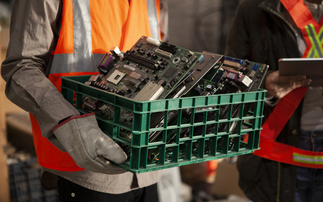Tom Chivers talks to Veolia's Richard Kirkman about the 'cultural shift' that has reshaped the waste industry and sparked the development of thousands of high tech green roles
"It's been a huge cultural shift," admits Richard Kirkman. "Twenty years ago we were landfilling everything, water all went through sewage treatment. Recycling was niche, mainly charitable. Now it's providing the raw materials for industry."
Kirkman is the chief technology and innovation officer for Veolia, a huge multinational recycling company. You probably come into contact with it when its lorries collect your bins. Kirkman, though, doesn't think of it as refuse collection - he thinks of it as an engineering problem.
"I trained as a mechanical engineer," he says. "I got into production engineering and found it a bit dull, making widgets. At the time there was a lack of thinking about the environmental impact that making things had - the water and waste that was produced - so I went into environmental engineering, about 15 years ago."
As such, Kirkman has played a role in the cultural shift that has reshaped the industry over the past decade or so. "We were able to solve so many problems," he recalls. "We brought in all these great engineers - we now have a team of about 200."
Household recycling has become much more standard in recent years with around half of UK household waste now recycled - and the bin collection is just a small part of the process. It's the automated sorting that is the real magic, using sieves and magnets and infrared detectors, which allows effective recycling even in big cities such as London, where those living in flats rarely have room for multiple bins for glass, cardboard, and so on.
But the biggest change recently has been in industry. "The industrial sector has really woken up to the fact that this is an opportunity for them as well," says Kirkman, explaining how he has recently been involved in the production of a massive milk-bottle recycling plant in London. The company handles around 300 million plastic milk bottles a year and recycling them into new containers uses 75 per cent less energy than using virgin material. On another pathfinder project glass bottles are being recycled into home insulation, creating new feedstocks for building materials through a process that saves the equivalent energy to power a 100-watt light bulb for almost an hour for each bottle recycled.
It's ultimately a problem-solving role, says Kirkman - a characteristic that makes for a rewarding career. "Being presented with a problem by an industrial customer and finding a way to solve it, coupling the technology with a solution that works, to save them material, water, carbon, in a way that's financially competitive; that's what I like," he says. "The complexity of it is what I like, although it can be frustrating."
He offers an example of a salad company that grows lettuce. Before, they'd grow lettuces, and produce waste water and biowaste. But now, "we can take the waste material they don't sell, and use that to create biogas to produce energy, and use that energy to treat their wastewater".
It is a case of turning the concept of a circular economy into reality. "Now they're completely self-sufficient, more environmentally friendly, and it's cheaper," Kirkman says. "We help companies become more circular."
But it's not just engineers who can work in this expanding field, he says. His team includes scientists and social scientists among many others. "Lots of different people can get involved," he says. And if you have ideas for how to improve your company's management of its waste and energy, you can implement the same circular principles in-house. "If you already work in the industrial sector, you can get involved where you are, lead change yourself," he says. "It doesn't have to be outsourced."
What's key, he says, is that green initiatives have to be economic. "I see lots of suggestions for how to improve things environmentally," he says. "But I believe you need to make it commercially viable for it to drive those improvements. This company helps people save lots of energy and water, but we make a profit doing it. There's nothing wrong with that."
We're still only "part-way through the journey" on recycling, admits Kirkman. There's a bit more to do on household waste - perhaps another 20 per cent of waste can avoid landfill. "But if you look at the industrial sector and how they use water and waste, there's huge scope to grow, he predicts. "More outsourcing can provide huge savings. And especially with energy - that whole area is decarbonising, cleaning up. It's getting easier to make the energy and dispatch it to the grid. The whole area is in a state of change."
It is a period of transformation that is sparking multiple employment opportunities across an industry that is too often ignored or dismissed as simple waste handling.
The future of the recycling industry is bright, says Kirkman, but he adds that there are things government can do to support the next phase of development - mainly, by making its plans for green subsidies and taxes over the next few years more explicit. "We've spent about £1.2bn in the UK," he says, "and we've got about another billion we'd like to invest. But what we need is certainty about the landscape. So the landfill tax, subsidies for green energy - those things should continue. It doesn't matter exactly at what level, but there needs to be clarity and stability, so we know what they'll be in the long term and we know how much to invest."
With the government's new waste and resource strategy promised in the coming months and pressure on businesses to slash waste levels only increasing the long term prospects for the recycling sector look positive, assuming of course it can navigate any policy confusion thrown up by Brexit.
The "cultural shift" that has shaped the sector and created thousands of new high tech green jobs has a way to run yet.









